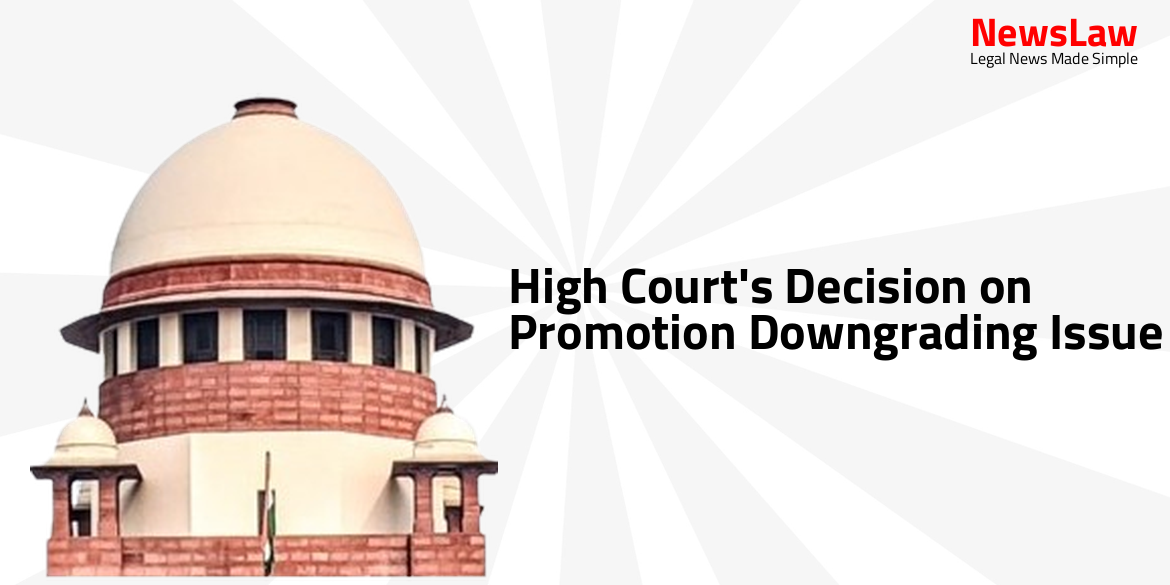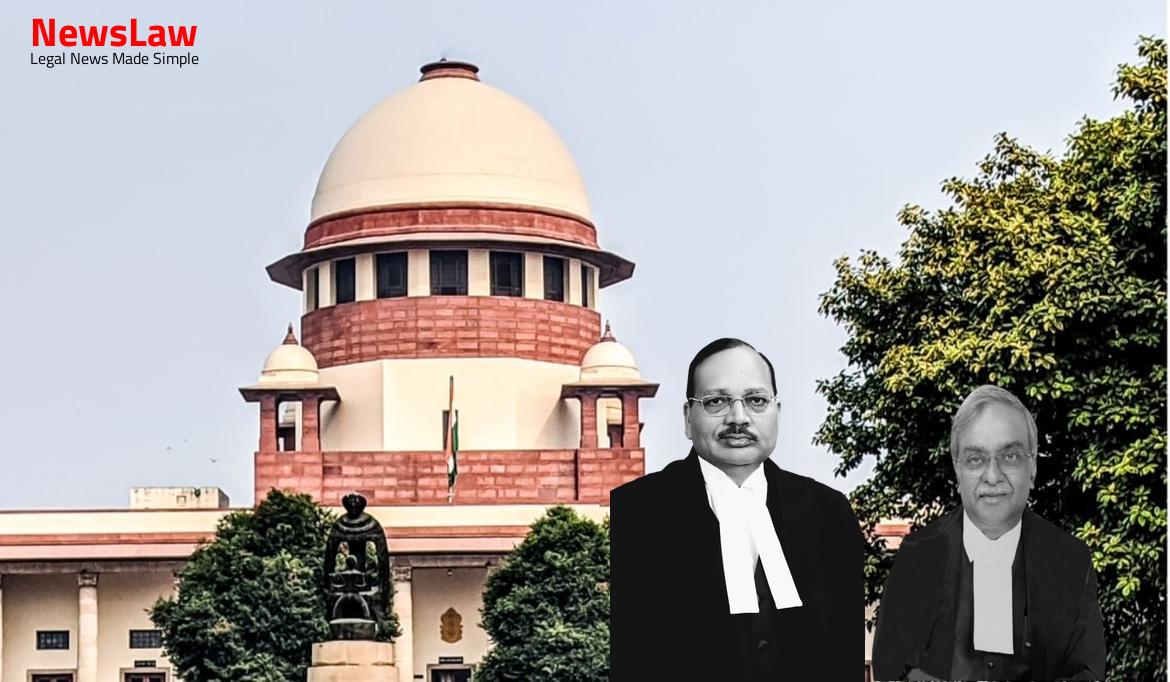In a significant legal case, the Supreme Court of India has delivered a judgement on the intervention in trust sale proceedings related to a land dispute. The case involves the resolution of conflicting claims over the sale of trust property, with Respondent No. 4 and 5 challenging the procedure followed by the State Government. The Court’s decision sheds light on the protection of the interests of perpetually minor entities and the proper execution of trust property transactions.
Facts
- The State Government exercised its inherent power when alienation was deemed unnecessary or not beneficial to the institution.
- The appellant purchased land through sale deeds on 2 August, 2005 and 30 August, 2005.
- Intervenors filed an appeal to revisit the procedure, but their claim was time-barred.
- The State Government considered the sale price, opinion of Inspector Endowments, and the permissions granted before directing a public auction for the remaining land.
- The appellant was given first choice to purchase the land at Rs. 10 lakhs per acre.
- Commissioner Endowments directed for public auction in compliance with Rules 1959.
- The order by Commissioner Endowments was published as per statutory requirements.
- Appeals against Commissioner Endowments’ decisions are provided for under the Act.
- Inspector Endowments’ reports and receipts of payment were considered to support the proposed sale.
- Opposite party appeared and responded after publication of the notice.
- High Court directed fresh fixation of upset price for public auction of land with minimum rate of Rs. 25 lakhs per acre.
- Concealment of land purchase by intervenors for lower price was noted.
- Application for permission to sell land was based on its barren state and lack of income for the institution.
- Appellant claimed tenancy and payment of bhag to the deity for the land in possession.
- Sale permission was granted considering market value and need for income generation for the institution.
- The land measuring Ac. 2.019 decimals was sold in February 2005 by a registered sale deed and is no longer available for public auction.
- There were no procedural defects in the decision-making process as per the Act, 1951.
- The Single Judge dismissed the writ petition on February 25, 2008, allowing public auction of the remaining land after following the prescribed procedure.
- Respondent nos. 4 & 5 challenged the Single Judge’s order in Letters Patent Appeal.
- The Division Bench allowed the appeal on April 8, 2009, stating lack of evidence of tenancy and no basis for fixing the price at Rs. 10 lakhs per acre.
- The Division Bench directed the Commissioner Endowments to put the total land for public auction at Rs. 25 lakhs per acre offered by respondent nos. 4 & 5.
- If the property failed to fetch Rs. 25 lakhs per acre, respondent nos. 4 & 5 were responsible to purchase it at that rate.
- Failure to deposit the amount would lead to recovery by the District Collector, Ganjam as land revenue.
Also Read: Restitution Order in the Case of Temple Management: High Court vs. State
Arguments
- Appellant was in possession of the subject land as a tenant, confirmed in the application filed before the Commissioner Endowments.
- The appellant paid bhag(share) for a sufficient period, supported by receipts and Inspector Endowments’ report.
- Commissioner Endowments fixed a valuation for the land at Rs. 10 lakhs per care in an order dated 22 February 2005.
- The argued point by the learned counsel for Respondent No 4 and 5 is that they had offered to purchase the land at Rs. 25 lakhs per acre, but their offer was not considered.
- The counsel emphasized that the deity, being a perpetual minor, cannot be divested of its immovable property rights, and the state authorities must protect the interests of such minors/disabled persons.
- It is stated that the property belonging to the deity should be sold at the best possible price to serve the deity’s best interests, as determined by the manager/trustee/pujari and ultimately the State Government under the Act, 1951.
- The counsel mentioned that their clients are willing to pay Rs. 75 lakhs per acre for a specific portion of the land, but no offer was made for the remaining land directed for public auction by the State Government.
Also Read: Land Dispute: Legal Battle between Smt. Harinder Singh Ghuman and Lt. Col. Paramjit Singh Dhillon
Analysis
- The Division Bench of the High Court committed a manifest error by not appreciating the concurrent finding of the Single Bench and proceeding on a tangent.
- Intervenors, who had no stakes in the matter, attempted to nullify the registered sale deed through an indirect public offer.
- Intervenors should have questioned the registered sale deed through appropriate legal proceedings instead of attacking the competent authority’s procedure.
- Intervenors’ offered price was likely made to frustrate the authority’s action, as they had purchased adjoining land at a higher rate previously.
- The Division Bench’s blanket order to put the total land to public auction and nullify the sale deed without proper appraisal is legally questionable.
- The sale deed was not alleged to be obtained by fraud or in contravention of the law by the intervenors at any stage.
- The Commissioner Endowments followed the mandate of law in granting sanction for the sale, which included communication to the State Government and the trustee.
- The appellant, as a long-term tenant of the land, expressed interest in purchasing it, leading to the Commissioner fixing the price at Rs. 10 lakhs per acre.
- The Division Bench initially focused on protecting the interests of the deity, being a perpetual minor, and the obligation of the State authority to do so.
- The appellant’s concern was limited to the specific land mentioned in the sale deed executed in their favor.
- Any decision to alienate immovable trust property must be sanctioned by the Commissioner as necessary or beneficial to the institution.
- Provision for communication of lease deed execution with renewal condition to the Commissioner.
- Requirements for lessee to deliver possession after lease expiry.
- Appeal mechanism to State Government for modifying or setting aside orders related to alienation of trust property.
- The Division Bench of the High Court made a manifest error of law and facts
- The Division Bench set aside the concurrent finding of the Single Judge
- The decision of the Division Bench was deemed legally unsustainable
Also Read: Supreme Court’s Judgment on Investigation Standards in Special Case No 37/11
Decision
- Learned counsel for Respondent No. 4 and 5 offered Rs. 75 lakhs per acre for total land of Ac. 4.255, including Ac. 2.019 deeded to the appellant.
- The judgment of the Division Bench of the High Court dated April 8, 2009 is set aside.
- No costs to be incurred.
- Pending applications, if any, are disposed of.
Case Title: K. ARJUN DAS Vs. COMMISSIONER OF ENDOWMENTS, ORISSA
Case Number: C.A. No.-009576-009576 / 2010



